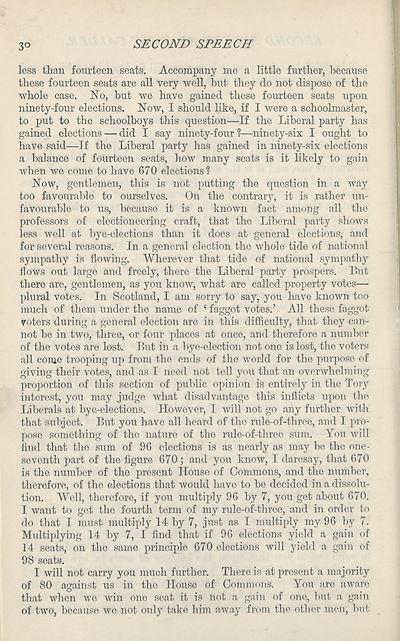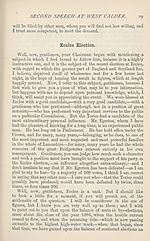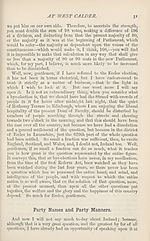Download files
Complete book:
Individual page:
Thumbnail gallery: Grid view | List view

3°
SECOND SPEECH
less than fourteen seats. Accompany me a little further, because
these fourteen seats are all very well, but they do not dispose of the
whole case. No, but we have gained these fourteen seats upon
ninety-four elections. Now, I should like, if I were a schoolmaster,
to put to the schoolboys this question—If the Liberal party has
gained elections — did I say ninety-four?—ninety-six I ought to
have said—If the Liberal party has gained in ninety-six elections
a balance of fourteen seats, how many seats is it likely to gain
when we come to have 670 elections?
Now, gentlemen, this is not putting the question in a way
too favourable to ourselves. On the contrary, it is rather un¬
favourable to us, because it is a known fact among all the
professors of electioneering craft, that the Liberal party shows
less well at bye-elections than it does at general elections, and
for several reasons. In a general election the whole tide of national
sympathy is flowing. Wherever that tide of national sympathy
flows out large and freely, there the Liberal party prospers. But
there are, gentlemen, as you know, what are called property votes—
plural votes. In Scotland, I am sorry to say, you have known too
much of them under the name of ‘ faggot votes.’ All these faggot
voters during a general election are in this difficulty, that they can¬
not be in two, three, or four places at once, and therefore a number
of the votes are lost. But in a bye-election not one is lost, the voters
all come trooping up from the ends of the world for the purpose of
giving their votes, and as I need not tell you that an overwhelming
proportion of this section of public opinion is entirely in the Tory
interest, you may judge what disadvantage this inflicts upon the
Liberals at bye-elections. However, I will not go any further with
that subject. But you have all heard of the rule-of-three, and I pro¬
pose something of the nature of the rule-of-three sum. You will
find that the sum of 96 elections is as nearly as may be the one-
seventh part of the figure 670; and you know, I daresay, that 670
is the number of the present House of Commons, and the number,
therefore, of the elections that would have to be decided in a dissolu¬
tion. Well, therefore, if you multiply 96 by 7, you get about 670.
I want to get the fourth term of my rule-of-three, and in order to
do that I must multiply 14 by 7, just as I multiply my 96 by 7.
Multiplying 14 by 7, I find that if 96 elections yield a gain of
14 seats, on the same principle 670 elections will yield a gain of
98 seats.
I will not carry you much further. There is at present a majority
of 80 against us in the House of Commons. You are aware
that when we win one seat it is not a gain of one, but a gain
of two, because we not only take him away from the other men, but
SECOND SPEECH
less than fourteen seats. Accompany me a little further, because
these fourteen seats are all very well, but they do not dispose of the
whole case. No, but we have gained these fourteen seats upon
ninety-four elections. Now, I should like, if I were a schoolmaster,
to put to the schoolboys this question—If the Liberal party has
gained elections — did I say ninety-four?—ninety-six I ought to
have said—If the Liberal party has gained in ninety-six elections
a balance of fourteen seats, how many seats is it likely to gain
when we come to have 670 elections?
Now, gentlemen, this is not putting the question in a way
too favourable to ourselves. On the contrary, it is rather un¬
favourable to us, because it is a known fact among all the
professors of electioneering craft, that the Liberal party shows
less well at bye-elections than it does at general elections, and
for several reasons. In a general election the whole tide of national
sympathy is flowing. Wherever that tide of national sympathy
flows out large and freely, there the Liberal party prospers. But
there are, gentlemen, as you know, what are called property votes—
plural votes. In Scotland, I am sorry to say, you have known too
much of them under the name of ‘ faggot votes.’ All these faggot
voters during a general election are in this difficulty, that they can¬
not be in two, three, or four places at once, and therefore a number
of the votes are lost. But in a bye-election not one is lost, the voters
all come trooping up from the ends of the world for the purpose of
giving their votes, and as I need not tell you that an overwhelming
proportion of this section of public opinion is entirely in the Tory
interest, you may judge what disadvantage this inflicts upon the
Liberals at bye-elections. However, I will not go any further with
that subject. But you have all heard of the rule-of-three, and I pro¬
pose something of the nature of the rule-of-three sum. You will
find that the sum of 96 elections is as nearly as may be the one-
seventh part of the figure 670; and you know, I daresay, that 670
is the number of the present House of Commons, and the number,
therefore, of the elections that would have to be decided in a dissolu¬
tion. Well, therefore, if you multiply 96 by 7, you get about 670.
I want to get the fourth term of my rule-of-three, and in order to
do that I must multiply 14 by 7, just as I multiply my 96 by 7.
Multiplying 14 by 7, I find that if 96 elections yield a gain of
14 seats, on the same principle 670 elections will yield a gain of
98 seats.
I will not carry you much further. There is at present a majority
of 80 against us in the House of Commons. You are aware
that when we win one seat it is not a gain of one, but a gain
of two, because we not only take him away from the other men, but
Set display mode to:
![]() Universal Viewer |
Universal Viewer | ![]() Mirador |
Large image | Transcription
Mirador |
Large image | Transcription
| Antiquarian books of Scotland > Politics & government > Political speeches in Scotland in 1890 > (34) |
|---|
| Permanent URL | https://digital.nls.uk/126568698 |
|---|
| Description | Thousands of printed books from the Antiquarian Books of Scotland collection which dates from 1641 to the 1980s. The collection consists of 14,800 books which were published in Scotland or have a Scottish connection, e.g. through the author, printer or owner. Subjects covered include sport, education, diseases, adventure, occupations, Jacobites, politics and religion. Among the 29 languages represented are English, Gaelic, Italian, French, Russian and Swedish. |
|---|

